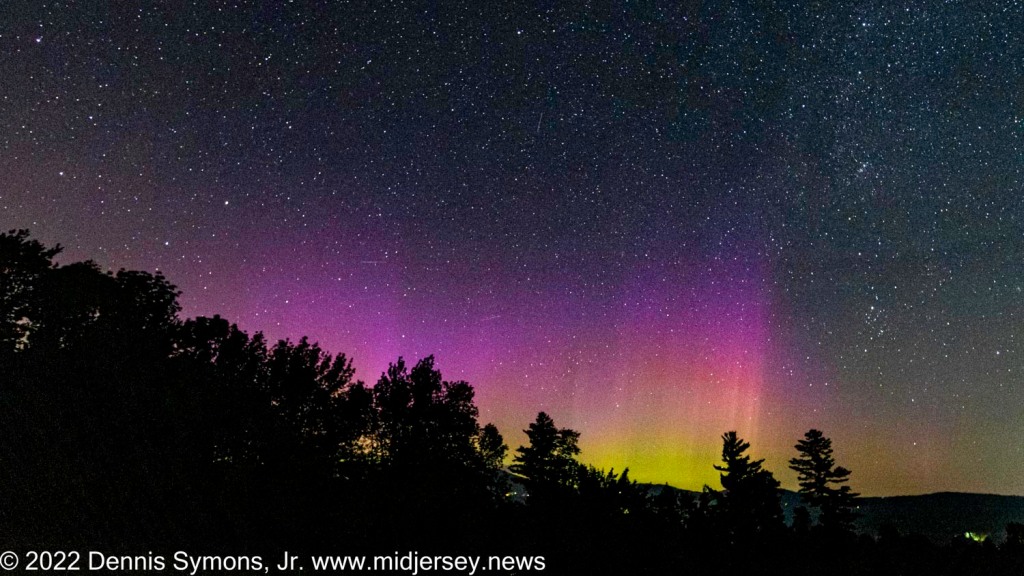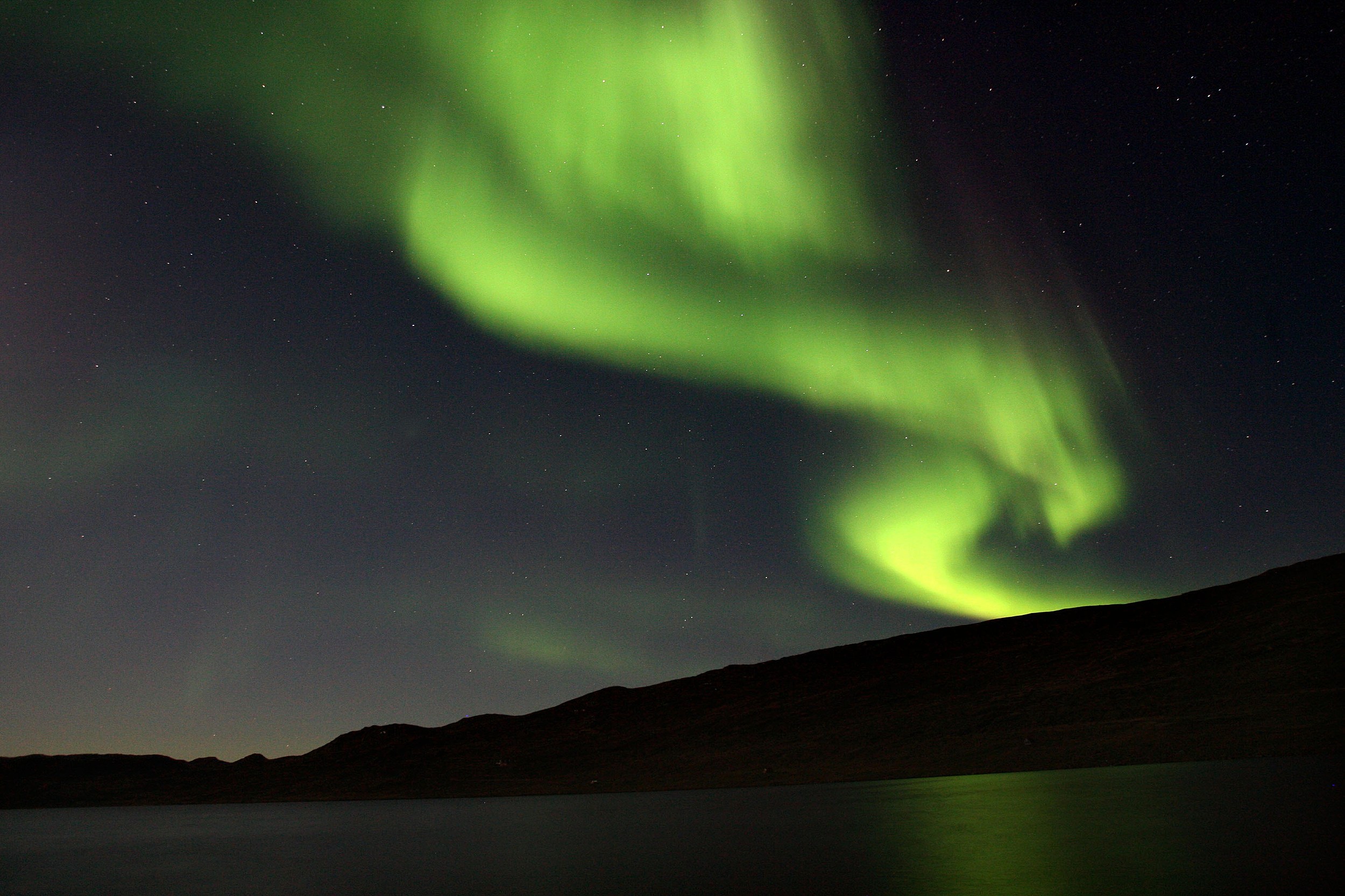The Unlikely Aurora: Understanding the Potential for Northern Lights in New Jersey
Related Articles: The Unlikely Aurora: Understanding the Potential for Northern Lights in New Jersey
Introduction
With enthusiasm, let’s navigate through the intriguing topic related to The Unlikely Aurora: Understanding the Potential for Northern Lights in New Jersey. Let’s weave interesting information and offer fresh perspectives to the readers.
Table of Content
The Unlikely Aurora: Understanding the Potential for Northern Lights in New Jersey

While the northern lights (Aurora Borealis) are most commonly associated with high-latitude regions like Alaska and Scandinavia, the possibility of witnessing this celestial spectacle in New Jersey, a mid-latitude state, might seem improbable. However, under specific and rare conditions, a glimpse of the aurora might be possible.
This article delves into the factors that influence the visibility of the northern lights in New Jersey, explores the historical occurrences, and provides insights into the likelihood of witnessing this phenomenon in the future.
Understanding the Aurora Borealis
The northern lights are a captivating display of vibrant colors dancing across the night sky. This mesmerizing phenomenon occurs when charged particles from the sun, known as the solar wind, interact with Earth’s atmosphere.
- Solar Wind: The sun constantly emits a stream of charged particles, known as the solar wind. This wind carries a significant amount of energy.
- Earth’s Magnetic Field: Our planet possesses a magnetic field that acts as a shield, deflecting most of the solar wind. However, some particles penetrate the field, particularly near the magnetic poles.
- Atmospheric Interaction: When the charged particles from the solar wind collide with atoms and molecules in Earth’s upper atmosphere, they excite these particles. As these excited particles return to their normal state, they release energy in the form of light, creating the auroral display.
The Importance of Geomagnetic Storms
The intensity of the northern lights display directly correlates with the strength of geomagnetic storms. These storms are caused by powerful bursts of energy from the sun, known as coronal mass ejections (CMEs).
- CMEs: These massive explosions release vast amounts of charged particles into space.
- Earth’s Magnetic Field Disturbance: When a CME reaches Earth, it can significantly disrupt our planet’s magnetic field, leading to a geomagnetic storm.
- Aurora Enhancement: During these storms, the influx of charged particles intensifies, causing the auroral oval to expand towards lower latitudes, potentially making it visible in places like New Jersey.
Historical Occurrences of Northern Lights in New Jersey
While rare, there have been documented instances of the northern lights being observed in New Jersey. These occurrences typically coincided with exceptionally strong geomagnetic storms.
- 1859 Carrington Event: This event, considered the most powerful geomagnetic storm in recorded history, caused widespread auroral displays, including those visible as far south as the Caribbean. It is highly probable that the northern lights were visible in New Jersey during this event.
- 1989 Quebec Blackout: Another significant geomagnetic storm in 1989 caused a major power outage in Quebec, Canada, and produced auroras that were visible in the northeastern United States, potentially including New Jersey.
Factors Influencing Visibility in New Jersey
Several factors influence the likelihood of observing the northern lights in New Jersey:
- Geomagnetic Storm Strength: The intensity of the geomagnetic storm is the most critical factor. Stronger storms push the auroral oval further south, increasing the chances of visibility in New Jersey.
- Sky Conditions: Clear, dark skies are essential for optimal viewing. Light pollution from cities can significantly hinder the visibility of the aurora.
- Time of Year: While auroras can occur year-round, they are more frequent and intense during the equinoxes (March and September) and the winter solstice (December).
Predicting Auroral Activity
Several resources can help predict auroral activity and the potential for northern lights visibility in New Jersey:
- Space Weather Prediction Center (SWPC): The SWPC, a division of the National Oceanic and Atmospheric Administration (NOAA), provides real-time space weather forecasts and alerts.
- Aurora Forecast Websites: Various websites dedicated to aurora forecasting provide detailed information on current auroral activity and potential visibility in different regions.
- Social Media: Many aurora enthusiasts share updates and photos on social media platforms, providing valuable information about recent auroral displays.
Related Searches
Here’s a deeper exploration of related searches, offering comprehensive insights into various aspects of northern lights in New Jersey:
1. Northern Lights New Jersey Tonight: While predicting the exact timing and visibility of the aurora is challenging, websites like the SWPC provide real-time updates and forecasts that can indicate potential viewing opportunities.
2. How to See the Northern Lights in New Jersey: Finding a location with minimal light pollution is crucial. Dark sky parks and remote areas away from urban centers offer the best chances of observing the aurora.
3. When Can I See the Northern Lights in New Jersey? While the northern lights can be seen in New Jersey during strong geomagnetic storms, the equinoxes (March and September) and the winter solstice (December) offer higher probabilities due to increased auroral activity.
4. Northern Lights New Jersey 2023: The year 2023 has witnessed several geomagnetic storms of varying intensity. Keep an eye on the SWPC and aurora forecasting websites for updates on potential visibility.
5. Northern Lights New Jersey Map: While no specific map exists for New Jersey, aurora forecasting websites often use interactive maps that show the predicted auroral oval, allowing you to assess potential visibility in your region.
6. Northern Lights New Jersey Live Stream: Several websites and social media channels offer live streams of the aurora from various locations around the world. These streams can be a valuable tool for witnessing auroral activity in real-time.
7. Northern Lights New Jersey Photos: Numerous websites and social media platforms showcase stunning photos of the northern lights, including some captured in the northeastern United States. These images can provide inspiration and a glimpse into the beauty of this celestial phenomenon.
8. Northern Lights New Jersey History: Researching historical accounts of auroral sightings in New Jersey can offer insights into the frequency and intensity of past events, providing valuable context for understanding the potential for future sightings.
FAQs
Q: Is it possible to see the northern lights in New Jersey?
A: While rare, it is possible to witness the northern lights in New Jersey during exceptionally strong geomagnetic storms that expand the auroral oval southward.
Q: When is the best time to see the northern lights in New Jersey?
A: The equinoxes (March and September) and the winter solstice (December) offer higher probabilities due to increased auroral activity. However, strong geomagnetic storms can occur at any time of year.
Q: Where is the best place to see the northern lights in New Jersey?
A: Dark sky parks and remote areas away from urban centers with minimal light pollution offer the best viewing opportunities.
Q: What are the chances of seeing the northern lights in New Jersey?
A: The chances of seeing the northern lights in New Jersey are low but not impossible. The likelihood depends on the strength of the geomagnetic storm and other factors like sky conditions.
Q: How can I be notified about potential northern lights sightings in New Jersey?
A: Monitor websites like the Space Weather Prediction Center (SWPC) and aurora forecasting websites for real-time updates and alerts.
Tips for Observing the Northern Lights in New Jersey
- Check the Forecast: Monitor space weather forecasts for alerts about potential auroral activity.
- Choose a Dark Location: Find a location with minimal light pollution, such as a dark sky park or a remote area away from cities.
- Be Patient: The northern lights can be unpredictable, so be prepared to spend some time waiting for a display to occur.
- Dress Warmly: Even in summer, nights can be chilly, so dress appropriately for the weather.
- Use a Camera: If you have a camera, experiment with different settings to capture the beauty of the aurora.
Conclusion
While the northern lights are typically associated with higher latitudes, the possibility of witnessing this celestial phenomenon in New Jersey exists, albeit rarely. Understanding the factors that influence auroral visibility, such as geomagnetic storms and sky conditions, is crucial for increasing your chances of observing this captivating display. By monitoring space weather forecasts and seeking out dark sky locations, you can increase your odds of experiencing the magic of the northern lights in New Jersey.







Closure
Thus, we hope this article has provided valuable insights into The Unlikely Aurora: Understanding the Potential for Northern Lights in New Jersey. We thank you for taking the time to read this article. See you in our next article!

